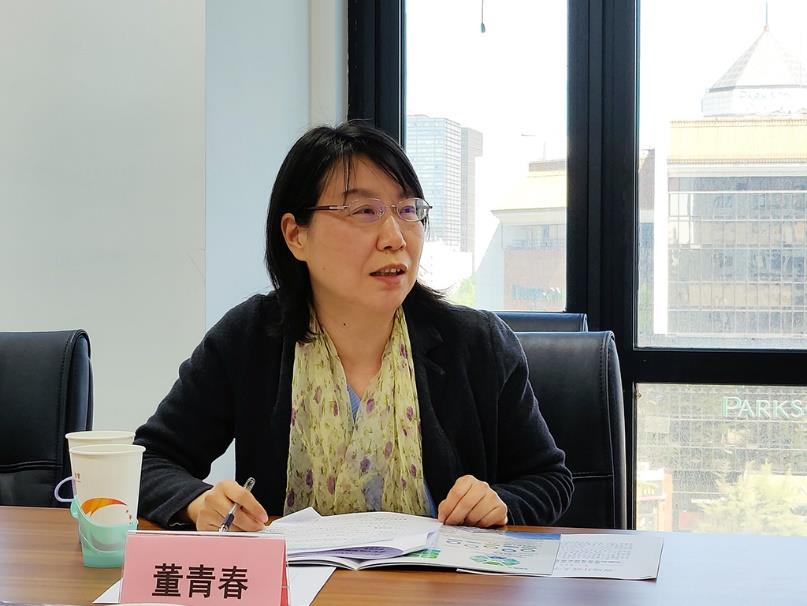 On 13 April 2021, a conference to verify joint certification of innovation and entrepreneurship for Entrepreneurship and Small Business (ESB) was held on the Fuxingmen campus of the Open University of China (OUC).
On 13 April 2021, a conference to verify joint certification of innovation and entrepreneurship for Entrepreneurship and Small Business (ESB) was held on the Fuxingmen campus of the Open University of China (OUC).

Qu Zhenyuan, a member of the National Advisory Council on Education, and president of the Sixth Council of the Chinese Association of Higher Education (CAHE); Dong Qingchun, a member of the Innovation and Entrepreneurship Education Steering Committee of the Ministry of Education, and president of the School of Entrepreneurship Management and Training at Beihang University; Hu Yang, director of the Department of External Education and Training at the OUC; Yan Xiaoping, executive deputy-director of the OUC Credit Bank; Shi Jianjun, vice president of Qingdao Open University (Qingdao OU); Yang Jie, general manager of the Social Responsibility Department of Bytedance Inc.; Professor Huang Guizhou, vice director of the Innovation and Enterprise Education branch of the CAHE, and chair of the New Future Online Education Group (NFOEG); Zhang Weiwei, NFOEG executive vice president, and executive director of the ESB China Management Centre; and other well-known experts and scholars, as well as company and university representatives involved in innovation and entrepreneurship education, attended.
During the meeting, Zhang Weiwei introduced in detail the ESB International Certification-verification Report on Innovation and Entrepreneurship to the experts. ESB Innovation and Entrepreneurship Joint Certification is a collaboration of the American Council on Education (ACE), Network for Teaching Entrepreneurship (NFTE), and the OUC, and aims to provide high-quality innovation and entrepreneurship evaluation and certification services to the OUC's 4.66 million students and faculty.
Attendees held in-depth discussions concerning the introduction of training standards related to the joint certification, the development of rules for conversion of learning outcomes, and methods for promoting the initiative.

Professor Qu Zhenyuan noted that, despite China's late start in innovation and entrepreneurship education, it has become integrated into talent training and national policy. To promote development of the economy and society, innovation is urgently needed, and this kind of education means that the employment of college students has become a top priority nationwide. ESB certification collaborating with the OUC will help to cultivate innovative talents, and have a substantial effect on economic, social and industrial development.

Dong Qingchun said that, at present, China lacks authoritative innovation and entrepreneurship certification, and expressed the hope that, through this joint certification, the sides will work together to combine professional education with education in entrepreneurship and innovation, accelerating the construction of courses and practical training while launching more systematic and professional curricula, so as to match local certification programmes to nationwide needs.
Hu Yang said that non-degree education is of great significance to enhancing national human resources. The OUC has attached great importance to the development of non–degree education for many years, and this certification project will help implement the Strategy for the Development of Social Training and support new approaches to training in collaboration with industries and enterprises. It will also play an important role in building the social-training brand of the OUC and expanding its influence.
According to Yan Xiaoping, the joint certification of ESB innovation and entrepreneurship will be incorporated into the national Credit Bank system, leading to further discussion of teaching implementation, assessment, issuing of certificates, credit conversion, and other topics, so as to ensure the high-quality implementation of the project.
Shi Jianjun said that innovation and entrepreneurship education in China’s colleges and universities still faces problems such as weak entrepreneurship-teaching teams, inadequate curricula, teaching methods and textbooks, and a lack of an effective assessment and evaluation system. In November 2020, Qingdao OU introduced the ESB international-certification system, which turned out to be of great value to the university, helping teachers become better at teaching entrepreneurship and innovation, enhancing the curriculum, and putting in place effective evaluation.
Huang Guizhou stated that the development of the new era, a new economy, and emerging industries have given rise to an urgent demand for innovative talents, and their education in terms of thinking and of practical skills. Through this project, the NFOEG and OUC will collaborate on the basis of their respective advantages, focusing on cultivating and evaluating student innovation and entrepreneurship, and developing a project demonstrating the new approach to education.
Yang Jie said that the Social Responsibility Department of Bytedance has always been committed to rural revitalisation by promoting employment and entrepreneurship using new media. However, there are some problems with entrepreneurship training, such as a lack of professionalism and of systematic development. He expressed the hope that, through this meeting, the participants would become deeply involved in the joint certification of ESB innovation and entrepreneurship, and the construction of an entrepreneurship-training system would be sped up, to the benefit of rural revitalisation.
According to Zhang Weiwei, ESB innovation and entrepreneurship joint certification is an important way to respond to national policies, carry out business cooperation, promote mass entrepreneurship and innovation, and promote entrepreneurship-based employment. It can meet market demands, deal with the problems facing China’s colleges and universities, and have a positive role in deepening reform of innovation and entrepreneurship education.
The joint certification of ESB International Certificate of Innovation and Entrepreneurship was successfully verified, and the expert group agreed to promote its implementation, since it meets national policy requirements and market demand, signing their names to a statement.
ESB is an international certification based on entrepreneurship thinking and innovation and entrepreneurship practical ability for university students, potential entrepreneurs, and owners and management personnel in small and medium enterprises. The ESB certificate is proof that its holder has mastered the core knowledge of and key routes to innovation and entrepreneurship and has been equipped with the tentative and basic skills and achievements needed to found and manage small businesses.
The ESB certification is issued by Pearson VUE Certiport and jointly signed and recognised by the American Council on Education and Network for Teaching Entrepreneurship. It conforms to the EU Entrepreneurship Competence Framework and is applicable in 148 countries.
By OUC